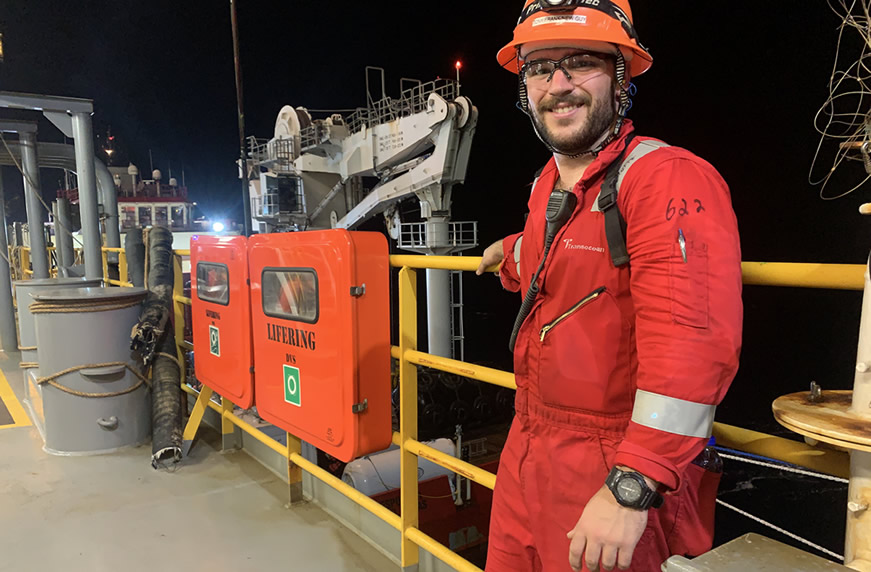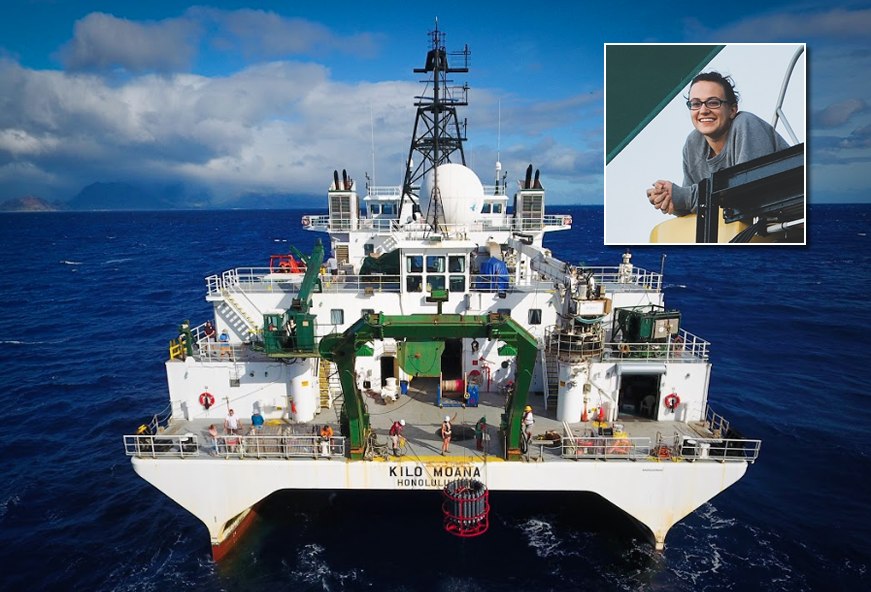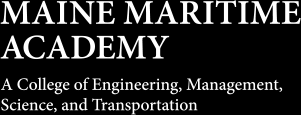BARELY A MONTH after graduating as a Marine Transportation Operations major, Anthony Franchetti ’19 was set to catch a plane to Trinidad, where he will work as Third Mate aboard a drillship for Transocean Ltd.
“Yes, I have a job sailing on my license and am very fortunate,” he says.
Luck may have played a role, but more likely, he, like other recent graduates and those who came before them, landed a job as a result of hard work and study while a student.
“At MMA, we used to joke as graduation drew near that we could see the light at the end of the tunnel,” says Franchetti. “What you don’t know is what lies beyond the tunnel. What will work and life be like once you’re on your own?”

Like most young MMA alumni, Anthony Franchetti quickly found a job.
Recent alumni, classes from 2009 to 2019 and numbering some 2,100 graduates, share many concerns with those of past decades. Yet they are entering a different world, where balancing job, family, and finances and having a fulfilling lifestyle are buffeted by the pace of change in technology, the economy and differing expectations.
Seeking Answers
In May, with interest in learning more about their concerns and how MMA might address them, the MMA Office of Alumni Relations fielded an on-line survey of approximately 1,400 recent alumni, of whom 131 responded (11 percent).
“Because of record enrollments, graduates from the past decade represent nearly a quarter of all MMA alumni,” says Alumni Relations Director Jeff Wright. “That’s an important and unique cohort we want to assist. The recent alumni survey is just one way to learn what’s on their minds, to identify their needs and to solicit ideas.”
This article explores the results, comparable national data and the points of view of four representative alumni.
In what region do you reside?
Of those who participated in the recent alumni survey, almost half live in Maine. Another 21 percent live in New England.
Do you work in an industry related to your MMA degree?
Eighty-five percent of respondents answered: yes.
Ten years ago, on the heels of the Great Recession in 2009, Omar Chaar was embarking on his first job with excitement and anticipation, just as Franchetti is now. And while many college graduates in the U.S. faced bleak employment prospects, Chaar, an International Business and Logistics major, had a job lined up with his diploma in hand.
“I was hired by Strategic Maintenance Solutions, a Maine-based company founded by two MMA grads whom I had interned with for two summers,” says Chaar. “The company’s focus is on helping businesses improve maintenance and reliability activities through computerized management systems.”

Omar and Allyson Chaar with one-year-old Xavier. “When I’m working, I try to put everything I have into whatever I’m trying to accomplish,” says Omar. “During family time, I try to disconnect, focus on them, and enjoy new things.”
Chaar started as a field engineer and is now Director of Industry Solutions for SMS, which employs some 150 people and works with life sciences, oil and gas, maritime, power generation and government clients in the United States and internationally.
“Frankly, the job market was pretty hot in 2009 for most MMA grads. Salaries were good,” says Chaar, “and my student loan debt was manageable.”
In 2010, 94 percent of MMA graduates were employed within 180 days, according to the U.S. Maritime Administration (MARAD). Data for the Class of 2018 indicates 90 percent of graduates were employed within 90 days.
In fact, consistent employment opportunities have provided many MMA graduates with a stable financial foundation early in their careers.
Job Satisfaction
Almost 90 percent of survey respondents said they are very or mostly satisfied with their jobs.
Julianna Diehl, who graduated in 2017 with a dual major in Marine Science and Small Vessel Operations, recounts that the primary reason she enrolled at MMA was to be around boats and learn more about science. “The MMA program was the only one of its kind that allowed me to do both and earn a degree and a 200-ton license.”
Diehl is a marine technician who works aboard research vessels for the University of Hawaii. Her primary roles are as an operator of multi-beam ocean floor mapping equipment and navigator for one of the vessel’s remotely operated vehicle (ROV).
“I put the skills I acquired at MMA to work every day,” she says.
“What I find most satisfying is the challenge. I could never settle for a job that’s the same day in and day out,” says Diehl. “Since the types of research projects we assist with are continually changing, so are the elements of problem-solving and working with different people.
“I’m making the most of the opportunity to learn and see a beautiful part of the world.”
What are the most pressing issues facing you today?
When asked to rank their most pressing issues, 57 percent of survey respondents said work-life balance is most urgent, while 43 percent ranked family uppermost.
57 percent of young alumni say work-life balance is the most urgent issue they face
Like the majority of other respondents, while focused on career success, Diehl is also concerned about “work-life balance,” the meaning of which depends on individual interpretation.
For Diehl, who is single, mobile, and for whom debt is not a concern, work-life balance translates into making the most of opportunities at work and leisure. She balances her life at sea with travel around the Pacific region, including a recent trip to Japan, Thailand, and the Maldives. “Without this job,” she says, “I wouldn’t be able to take so much time off to travel.”
Nathan Dublin ’15 graduated with a Marine Engineering Technology degree and is Second Assistant Engineer on a drillship in the Gulf of Mexico for Rowan Companies, and the definition of work-life balance for him closely equates with managing family affairs as a key priority. He and his wife, Joanna, have an eight-month-old son, Nolan, and working in the shipping industry “takes a special kind of family,” he says.

Nathan Dublin spends a cumulative six months away from his wife Joanna and son Nolan annually. But for now they are managing the push-and-pull well.
“Typically, your income is great, so debt is not an issue. But I work three weeks on and three off, and being gone for a total of six months a year becomes harder as your children grow older” says Dublin.
“We manage it well. My wife’s dad was in the Navy, so she understands the lifestyle, but I can see a point where it will become more difficult.”
National Trends
Work-life balance as a priority for recent graduates is mirrored on a national level as well, with multiple surveys indicating its importance as a factor in choosing jobs. It is a sought-after attribute and, many experts say, an expectation that sets the current decade’s workers apart from those who preceded them.
“Earlier generations were probably too afraid to ask for flexibility. The mind-set was that work comes first,” says Rose Ernst, national director of G10 Associates, in a recent article in Money magazine.
In a 2017 survey of more than 81,000 business, computer science and engineering students by Universum, work-life balance ranked number one as the highest-listed job value, which in this survey was defined by work flexibility and variety.
Nearly one-third of millennials say managing their work, family, and personal responsibilities has become more difficult in the past five years, according to Money magazine. And nearly half are working more hours compared to older workers.
Money Management
In the MMA survey responses, debt management did not rank as much of a concern as it does to graduates on a national level, where student loan default rates continue to climb.
A report by Yahoo News states more than a third of those carrying debt do not expect to pay it off in their lifetimes. This is not the case for Franchetti, who expects to quickly pay off student loan debt because of his salary and lifestyle choices, such as continuing to live at home with his parents initially and driving an older used car.
While the national student loan default rates stand at 13 percent, for MMA graduates it is 2 percent.
The sea change in the cost of higher education at American public colleges and universities is particularly striking. Over the last quarter-century, average tuition rose by 85 percent, adjusting for inflation, while average state spending measured on a per-student basis declined by roughly 5 percent.
How much impact did MMA have on who or where you are today?
Twenty-eight percent of respondents answered, “most impactful experience to date,” while 60 percent rated it “very impactful.”
“MMA shaped my confidence,” says Diehl. “As a relatively young female, I was in charge of a lot of older men on the back deck for different scientific deployments.
“But I had a strong base of skills, and it made me comfortable to lead the operations and maintain a safe and efficient environment.”
For Omar Chaar, the impact of MMA is equivalent to the quality of relationships he formed with fellow students and alumni. “Those relationships shaped me into the person I am today,” he says.
“Being able to work at a company founded by MMA graduates (Jason Oney ’96 and Dan Hobart ’94), the types of people who work there, what I’ve gained from involvement with the academy, the faculty and administration … when I look back on it all, that’s what I’m most proud of and feel has impacted me the most.”
Network Matters
While alumni survey respondents acknowledged the role of MMA in their lives, also of crucial importance is the alumni network. The survey probed the role of social media in helping alumni stay connected with MMA news and each other.
It asked which type of alumni events might be most interesting. More than 70 percent of recent alumni respondents ranked opportunities for networking as their top choice.
What can MMA do to assist you?
“One of the priorities for the MMA Alumni Relations Office is to connect and find the most effective ways to communicate with and serve recent alumni,” says Wright.
“We’re exploring better ways to introduce recent alums to other grads in their area, for example,” he notes. Diehl, who uses social media to connect with classmates who may be passing through Hawaii while traveling or working, suggests exploring how a database might be made available to aid such efforts.

Julianna Diehl works aboard ocean research vessels based in Hawaii and says she’s taking advantage of the opportunity to learn and “see a beautiful part of the world.”
“If alumni keep their contact info current with us,” says Wright, “we can help in a variety of ways.
“Alumni Relations coordinates the Class Agent program, through which representatives from almost every MMA class serve to connect classmates so they can engage with other alumni.” (For more on Class Agents, see Alumni News.)
Wright cites research that shows most job openings are not advertised, and some 70 percent of employment is found through networking, according to the Bureau of Labor.
“The MMA alumni network is as strong as ever,” he says. “We are happy to assist young alumni with employment announcements, introductions, and pass along contact information to potential employers in cooperation with the Office of Career Services.”
Alumni Relations is also developing a Mentor Program that pairs junior and senior students with MMA alumni in related professional areas. “As the program develops, we’ll be seeking volunteers to serve as mentors,” says Wright.
Franchetti hopes the new MMA Center for Professional Mariner Development in Bucksport will offer certification courses and training that he now has to pursue at other locations. “It could save me and my company money in the long run and help me continue on my career track.”
When Franchetti looks ahead, now that he is “out of the tunnel” and in the light that shines on his future, his goal is to one day be “sailing on a captain’s license, and maybe starting a family.”
A shore-side job may become more attractive in the future for Nathan Dublin, “but for now, I just want to stay on track with our family plans, our life plans.”
While no one can predict his or her future, “young alumni can look at the success of others from MMA reaching back more than 75 years as examples,” says Wright, “and know that we are here to support them, and the skills and knowledge gained here will transfer to whatever endeavor they choose to pursue.
“Above all, stay in touch with us, and let’s keep the conversation going,” he says.█
Photo: Billy R. Sims & courtesy of Anthony Franchetti and Julianna Diehl
Contact the Alumni Relations Office: alumni@mma.edu; 207-326-2337.






Post Comment
Comments are moderated and will be reviewed prior to posting online. Please be aware that when you submit a comment, you agree to the following rules:
Maine Maritime Academy reserves the right to delete any comment that does not comply with these guidelines and is not responsible or liable in any way for comments posted by its users. If you have a message for the editor, please email mariner@mma.edu.
Features
View All >Read More
Read More